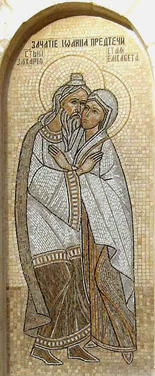
The name Elizabeth, which has been borne by several saints, means in Hebrew "worshiper of God." We can be certain of this truth as she has the distinction of being one of the first to know about Mary's great blessing as the Mother of God. A descendant of the priestly line of Aaron, she was a kinswoman—how close we are not told—of the Virgin Mary. According to the Gospel, Elizabeth had lived a blameless life with her husband in one of the hill-towns of Judea: “righteous in the eyes of God, observing all the commandments and ordinances of the Lord blamelessly.” However, having reached an advanced age with her prayers for a son unanswered, she thought that her barrenness was a reproach. Following the miraculous conception, and Zachary’s visit from Saint Gabriel, Elizabeth is visited by Our Blessed Mother, and realizes the great honor and task that the Lord has set before her. The Gospel story tells us further that at Elizabeth's delivery her friends and neighbors rejoiced with her, and when the child was brought to be circumcised, they were going to call him after his father Zachary, but his mother said, "His name shall be John."
Saint Zachary, whose name in Hebrew means “Jehovah hath remembered,” served as the High Priest in the Temple of Jerusalem, and had also lived an honorable and pious life. However, he was mocked and questioned by some, due to the fact that he had never produced a son. Following his visit from Saint Gabriel, Zachary was struck dumb, and his speech was not restored until he concurred with his wife’s assertion that their child be named John, despite no one of that name coming from their lineage.
Tradition, supported by Saint Basil and Cyril of Alexandria, asserts that when Herod set out to kill the Christ, he heard of the special circumstances surrounding Saint John's birth and tried to hunt him down. Saint Elizabeth took John, who was 18 months old, into the wilderness. They came to a mountain, and she spoke to it and a cave opened in it with a fresh stream and a fruitful date palm sprang up at its mouth. She escaped Herod's men by hiding in the cave. Saint Zachary died a martyr, killed in the Temple "between the porch and the altar" by command of Herod, because he refused to disclose the whereabouts of his son. Holy legend continues to tell us that the blood spilled in his martyrdom turned to stone as testimony against the reign of Herod. As the Roman Martyrology does not report this incident, it is unclear as the circumstances of this holy couple’s lives and deaths.




